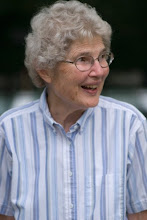I have been writing today about witches.
Using American communists or communist sympathizers in the McCarthy era as my starting point, I made four observations about characteristics of the witches in a given society, :
1) A witch stands against the basic assumptions of the virtuous group's social vision.
2) A witch evokes very real memories of persecution and fear.
3) Even a drop of Satan's blood is enough to make someone a witch.
4) It is seen as an act of virtue to expose and isolate a witch.
As I wrote, it occurred to me that these four principles may help explain the Christian persecution of Jews during the Medieval and Renaissance eras. Since most European societies were built on Catholic political thought, Jews called into question the dominant society's basic assumptions as surely as people who blatantly resist scientific or democratic principles in America today.
Jews were popularly associated both with memories of early persecution of then-minority emerging Christians by the more established community of mainstream Jews and with false accusations of responsibility in all sorts of missing child cases and other tragedies. In addition to believing Jews committed more crimes, Christians were probably also more likely to remember any crimes Jews were alleged to commit, giving an extremely skewed popular image of the threat of violence and ill-will represented by the Jewish community.
Even Jews who converted to Christianity were often faced with prolonged skepticism about the completeness of their conversion (and persecuted when it was suspected that they had retained any vestiges of Judaism whatsoever). And there certainly wasn't room in most European societies in the Medieval and Renaissance eras for Jews to offset their religious identity with other merits as a way to enter mainstream society,
And because Jews were seen as far from the dominant social and legal order, Christians probably felt virtuous for abusing them in much the same way that we are socially rewarded for verbally degrading people whose political views are farthest from our own today. It would be interesting to compare the things hard-core conservatives sometimes say about liberals and hard-core liberals say about conservatives today with the things pre-Enlightenment European Christians sometimes said about Jews.
We have changed since those days. We are certainly more tolerant about
religion, and we have protections in place against physical abuse and
segregation. But are there still shadows of the old European treatment
of Jews in the ways people from different ideological camps interact
with each other?
I wonder how the Merchant of Venice would play out today if it were set in a college theater department with the merchant as a straight-laced, traditional-marriage Republican in a sea of progressive Democrats. Would we be offended if part of his plea deal (after being outwitted by a man dressed in drag to disguise himself as the female Department Chair) was a pledge to vote for equality and register as a Democrat?
Reading at Writ & Vision Thursday
-
I'm going to be doing a reading at Writ & Vision in downtown Provo at 7 pm
this Thursday.
I'm excited: I love to read my work, but I don't actually do so v...
6 years ago
